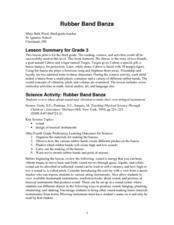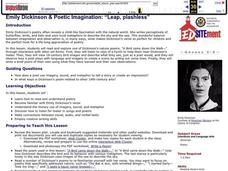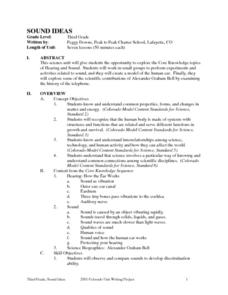Curated OER
Strum Along
Students engage in a lesson which takes something constructed by the class, that would be normally classified as just sound, then work together to make what can be perceived to be music. Students construct a basic stringed instrument...
Curated OER
It's too loud!
Investigate soft, loud, and dangerous sounds. Little ones put a check next to the sounds that are loud, an X next to ones that are soft, and circle the ones that would require protective ear wear. Tip: Get out a tape player or computer...
Curated OER
Good Vibrations
Third and fourth graders should enjoy this easy-to-implement activity involving a straw, and bottles filled with water. Learners manipulate the end of a straw in a way that results in a sound being made when it's blown. There is also an...
Curated OER
A Whale of a Story
Does sound travel faster in water or in the air? Put the question to the test with a science experiment. After reviewing a table of data, third and fourth graders decide which statements are true and which ones are false. The bottom of...
Curated OER
Waves
Light waves and sound waves are the focus of this science lesson designed for 5th graders. Besides discovering how these waves travel, learners also discover the basic properties of waves, and analyze data tables and graphs. The...
Curated OER
Wave Practice Problems
Physics scholars list the properties of waves and calculate the speed, wavelength, and frequency of waves. The worksheet is concise, but covers a variety of wave computational skills. The formatting is neat, but it does have small...
Curated OER
Typical Numeric Questions for Physics I - Waves
Physics masters figure out the wavelength of different waves. Looking at a wave graph, they identify different characteristics. Many more problems get them working with both electromagnetic and sound waves. There are a total of 17...
Curated OER
Rubber Band Banza
Third graders review ideas about sound and vibration to make their own stringed instrument. They review what a pictograph and bar graph are. Pupils conduct a survey within the classroom to choose the four favorite string instruments and...
Curated OER
Communication Delay
Construct a maze in your classroom and have a blindfolded scientist act as a space rover, maneuvering unfamiliar terrain while another scientist plays commander. Classmates record the number of occurrences of the commander having to...
Curated OER
Sounds like Science
Second graders create sound effects to produce a radio drama. In this sound lesson, 2nd graders read a book and provide the sound effects to transform it into a radio drama. They discuss sound and the shape of sound waves based on their...
Curated OER
Sound Busters
Fourth graders engage in a study of sound pollution at their school. After a class discussion on what noise pollution is, learners are asked if they think there are areas of their school or community where noise pollution is a problem....
Curated OER
Fourth Grade Science
In this science learning exercise, 4th graders complete multiple choice questions about electricity, the sun, sound, and more. Students complete 25 questions.
Curated OER
A Story About the Ear
Travel through the ear! Use this comprehensive presentation to cover hearing, hearing loss and the treatments paired with different types of hearing loss. Slides are too text-heavy for learners to copy, so provide them with a partially...
Curated OER
Finding Ocean Depth
How to oceanographers measure the sea's depth? Your scientists will step into their shoes in this application worksheet, first reading about how the speed of sound and a simple formula give scientists a depth estimation. Students...
Curated OER
Types of Energy
In this examples of energy worksheet, students complete the definitions to 9 different types of energy. Students write out an example of each type next to each definition.
Curated OER
"Leap, Plashless": Emily Dickinson & Poetic Imagination
Students read and explore one of Emily Dickinson's nature poems, "A Bird Came Down the Walk-" through interaction with a variety of art forms. Clips of a hymn to hear meter and the viewing of bird images exposes them to the language and...
Curated OER
Sound Extenders
Learn about communication engineers. Students observe a demonstration using a slinky of how to diminish sound with distance. They also learn about Alexander Graham Bell and his invention of the telephone.
Curated OER
Sound Ideas
Complete a unit of lessons on hearing and sound. Learners conduct sound experiments, research the history of the telephone and scientific contributions of Alexander Graham Bell, and create a model of the human ear.
Curated OER
Sound and Frequency
Pupils pose their hypothesis, they ready their instruments, then record their observations. This is the science of sound lesson. They move through 5 stations, each focused on a different element of aspect of sound. Check this lesson out,...
Curated OER
Poetry and Sound
How is poetry like music? It's all in the sounds. Provided in 17 slides are over a dozen poetry terms and their definitions. Some terms offer examples, and some do not. Consider adding examples for all terms so that you're as clear as...
Curated OER
Loud or soft?
Send this cute activity home with kids, to increase family involvement. They'll consider what would happen if rice was bounced in a tambourine, and then they'll complete a sound activity by makings an instrument out of wax paper and a...
Curated OER
High and low notes!
Little ones talk about how sounds can be made high or low depending on the length of the keys that make them. They label eight xylophone keys from highest to lowest depending on the relative sound they'd make. Tip: Get out a real...
Curated OER
Telecommunication: Sound Waves
Some interesting diagrams here will pique your students' interest as they discover what is actually inside the telephone that they use every day! The frequency and amplitude labels then lead to further details about sound and waves of...
Curated OER
Poetry: The Most Compact Form of Literature
Introducing or need to review literary devices and terms for a study of poetry? Though text heavy, the explanations and examples of key poetic devices will provide learners with the vocabulary they need to discuss and craft poems.

























